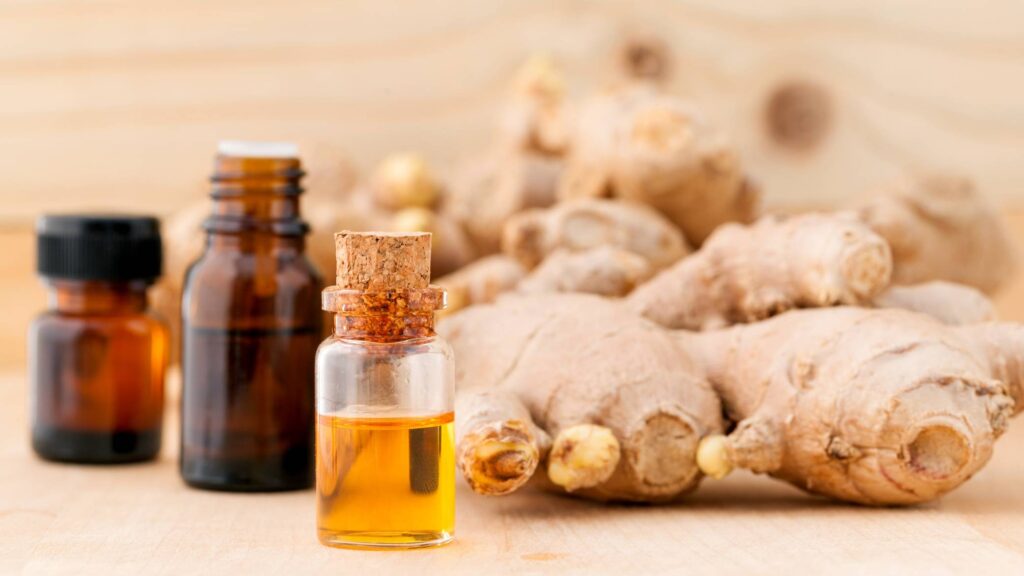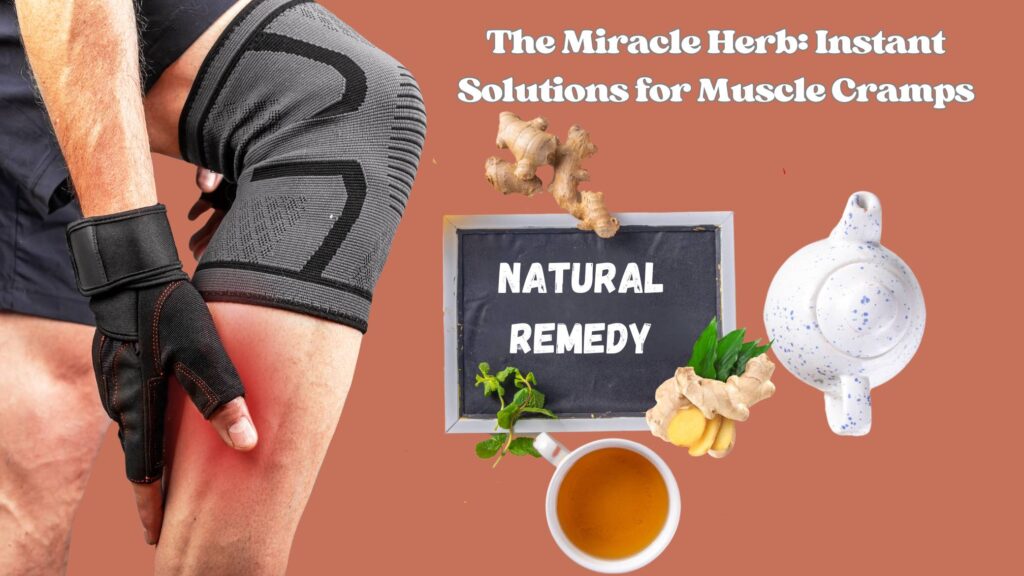Ginger, with anti-inflammatory compounds like gingerol and shogaol, offers natural relief from muscle cramps caused by dehydration, overexertion, and nutrient deficiencies.
Muscle cramps are sudden, painful contractions that can catch us off guard, affecting anyone from athletes to the average person. These cramps also known as spasms, can quickly ruin a day. It can be triggered by intense exercise, prolonged inactivity, or an unexpected stretch. Many treatments promise relief, only a few can provide swift and lasting effects. Some herb for muscle spasms can offer immediate relief, restoring comfort and mobility. One of them is the hidden power of this herb to cure muscle cramps instantly, bringing relief when it’s most needed.
Origins of Muscle Cramps
Muscle cramps occur from involuntary contractions that cause sudden discomfort. Common triggers include dehydration, overexertion, and mineral deficiencies in essential nutrients like magnesium, potassium, and calcium, which play important roles in muscle relaxation and contraction. Health conditions, such as diabetes or thyroid imbalances, and environmental factors, like intense heat, can also raise the risk of cramps. Plant remedies that focus on muscle relaxation and anti-inflammatory properties are valuable for combating these triggers.
Common Reasons Behind Cramps
- Dehydration: This leading reason results when fluid loss exceeds intake, disrupting electrolyte balance and causing spasms.
- Overexertion: Exercising without adequate hydration, preparation, or warm-up can exhaust muscles, making cramps more frequent. For active individuals, herb for muscle spasms can offer sustained support.
- Nutritional Gaps: Low levels of minerals like magnesium and potassium hamper muscle relaxation, making the way for cramps.
- Role of Hydration and Minerals: Hydration combined with a nutrient-rich diet aids muscular function, delivering vital minerals that ensure effective muscle contraction signals and support flexibility.
With this understanding, Natural relief methods such as plant-based therapy and herbal treatments can address the root causes of cramps for long-term muscle health.
Agony of Cramps
Unexpected nature of cramps often disrupts daily activities, creating an dislike to physical work. Long-term cramp sufferers might even adopt inactive lifestyles to avoid triggering spasms. This habit further weakens muscles, setting the stage for future cramps. Effective, natural painkillers that provide immediate relief while addressing underlying causes are essential for breaking this cycle and promoting long-term physical activity.
Introducing a Remarkable Botanical Herb for Muscle Spasms

The Natural Solution: Ginger
Ginger (Zingiber officinale), an herb celebrated for its therapeutic properties and known for its swift impact on muscle spasms. Packed with anti-inflammatory bioactive compounds such as gingerol and shogaol, ginger offers natural relief for muscle cramps. Available fresh, dried, or in supplements, this herbal supplement reduce cramps effectively while promoting overall well-being.
Origins and Traditional Applications
Ginger has deep roots in traditional medicines from India, China, and Indonesia. Revered in Ayurveda for digestion and circulation and in Traditional Chinese Medicine (TCM) for immune support, ginger is used to treat various disorder globally. This heritage supports its reputation as an effective herb for muscle spasms and a valuable plant-based therapy for relaxation.
Bioactive Compounds That Address Cramps
- Gingerol: Known for its strong anti-inflammatory properties, gingerol is largely found in fresh ginger, reducing muscle inflammation and relieving soreness.
- Shogaol: More concentrated in dried or processed ginger, shogaol improves blood flow, delivering essential nutrients to cramped muscles and boosting recovery.
Scientific Endorsement of Ginger’s Usefulness
Studies state that ginger’s usefulness in relieving post-exercise soreness and muscle spasms. The herb’s compounds support muscle recovery, making ginger one of the most powerful herb for muscle spasms caused by exercise, dehydration, or nutrient deficiencies.
Ginger’s Mechanism for Swift Relief
Ginger’s effectiveness lies in its ability to slow down prostaglandins—compounds responsible for pain and contraction—thereby reducing muscle tension. Gingerols boost circulation, oxygenating muscles and facilitating nutrient absorption, which provides an instant cure for muscle spasms and long-term resilience.
Maximizing Ginger’s Effects on Muscle Health
Methods of Use
Ginger’s flexibility makes it adaptable for different needs:
1. Fresh Ginger
Fresh ginger root is an accessible option that provides immediate effects for those experiencing cramps. It can be used in the following ways:
- Chewing Fresh Ginger: Ginger’s bioactive compounds, gingerols, and shogaols are highly concentrated in the fresh root. By chewing a small piece of ginger, these compounds quickly enter the bloodstream, where they act as natural analgesics, reducing muscle pain and inflammation. The anti-inflammatory properties also relax tense muscles, easing cramps.
- Adding to Smoothies: Adding fresh ginger to a smoothie not only enhances flavor but also makes it easier to consume regularly. Gingerols in fresh ginger help prevent future cramps by reducing inflammation, increasing circulation, and providing gentle muscle relaxation.
2. Dried Ginger
Dried ginger offers an intensified effect due to the presence of shogaol, a compound formed when fresh ginger is dried or cooked. Shogaol is known for its potent muscle-relaxing properties and enhanced anti-inflammatory effects. Here’s how dried ginger can be used effectively:
- Soothing Ginger Tea: Making tea with dried ginger is one of the best ways to enjoy its cramp-relieving benefits. To prepare the tea, simply add a few slices or a teaspoon of dried ginger to boiling water, let it steep for 10–15 minutes, strain, and sip slowly. The warm liquid further helps relax tight muscles, while shogaol improves blood flow to the affected area. This method is especially beneficial for those prone to nighttime leg cramps or frequent spasms from overexertion.
3. Ginger Supplements
Ginger supplements are ideal for those who want a consistent, controlled dosage of ginger, particularly for preventing cramps rather than only treating them as they arise.
- Consistent Dosage for Prevention: Ginger supplements, typically in capsules or powder form, provide a measured quantity of gingerol and shogaol. These bioactive compounds help reduce inflammation and muscle soreness over time, making the muscles less prone to cramping. Taking a supplement daily provides ongoing support for the muscles, helping to prevent frequent cramps, especially in athletes or those who engage in regular physical activity.
DIY Ginger Remedies for Targeted Relief
Ginger can be transformed into several DIY remedies to provide localized or immediate relief from cramps. Here are some effective ways to apply ginger externally:
- Ginger Tea: This method is straightforward yet effective. Boiling fresh ginger in water for 10–15 minutes and then sipping slowly can help with natural relief from muscle tension. The warmth of the tea relaxes the muscles while gingerols work internally to alleviate inflammation, providing a soothing and effective remedy for cramps. For added effect, ginger tea can be consumed after strenuous physical activities or in the evening if cramps are a recurring issue.
- Ginger Oil: For a more direct application, ginger oil can be applied directly to cramped muscles. Ginger oil can be either store-bought or prepared at home by steeping fresh or dried ginger in a carrier oil (such as olive or coconut oil) for a few days. To use, massage the oil gently in circular motions over the affected area, which encourages blood flow to the muscle, improves circulation, and helps the muscle relax. The warming sensation from ginger oil also has a soothing effect, making it ideal for quick relief from intense cramps.
- Ginger Paste: Creating a paste with ginger offers an intensive topical solution for sore or cramping muscles. Mix fresh ginger (grated or blended) with a carrier oil to form a thick paste. Apply the paste directly onto the cramping area and leave it on for 20–30 minutes. The paste will allow the ginger’s active compounds to penetrate deeply into the skin and tissues, targeting the cramped muscle with direct anti-inflammatory effects. For best results, cover the paste with a warm towel to enhance absorption and allow the heat to relax the muscles further.
Benefits of Using Ginger for Muscle Cramps
With these various preparations, ginger offers convenient and effective methods for those who suffer from frequent cramps. The active compounds in ginger quickly act to reduce inflammation and relieve muscle tightness, making it a valuable tool for natural, at-home cramp relief. The regular use of these ginger remedies can also contribute to improved muscle health and reduced cramp recurrence.
Beneficiaries of Ginger’s Therapeutic Powers
- Athletes: Ginger provides faster recovery from intense activity, promoting more frequent and effective training.
- Older Adults and Chronic Sufferers: The herb relieves muscle stiffness, restoring mobility for those with recurring cramps.
- Individuals with Nutritional Deficiencies: Even not a direct source of minerals, ginger’s muscle-relaxing effects complement diets that lack magnesium and potassium.
Safety and Precautions
Ginger is generally safe but should be used carefully by those on anticoagulants due to its blood-thinning properties. In excess, it may cause mild heartburn by increasing gastric acid. Always consult a medical professional when using ginger therapeutically.
Also Read: The Hidden Power of This Herb to Cure Muscle Cramps Instantly
FAQs
1.What is the Optimal Consumption Method?
Ans. Fresh ginger or tea provides fast results, while supplements support ongoing relief.
2. Can Ginger Help Other Health Issues?
Ans.Yes, it also benefits digestion, circulation, and overall inflammation.
3. What is the Relief Duration?
Ans. Most experience relief within minutes of ingestion or application.
4. Suitability for Pregnant Women or Children?
Ans. It’s generally safe but should be used under medical guidance.
5. Can It Be Grown at Home?
Ans. Yes, ginger is easy to cultivate indoors or outdoors.
Ginger, with its anti-inflammatory properties and versatile uses, provides quick and effective relief from muscle cramps while promoting long-term muscle health. Whether fresh, dried, or in supplements, this natural remedy addresses pain and its root causes, making it a reliable solution for all.






